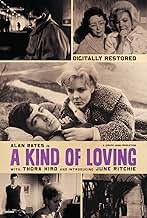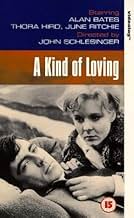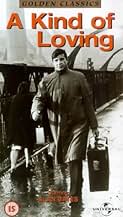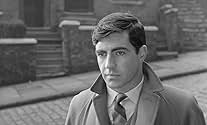VALUTAZIONE IMDb
7,3/10
2854
LA TUA VALUTAZIONE
Aggiungi una trama nella tua linguaAfter his girlfriend's pregnancy forces him to marry her, a young man must adjust to his new life and contend with his domineering mother-in-law.After his girlfriend's pregnancy forces him to marry her, a young man must adjust to his new life and contend with his domineering mother-in-law.After his girlfriend's pregnancy forces him to marry her, a young man must adjust to his new life and contend with his domineering mother-in-law.
- Regia
- Sceneggiatura
- Star
- Nominato ai 4 BAFTA Award
- 1 vittoria e 4 candidature totali
Recensioni in evidenza
This film reflects on how social and economic pressures impact on sexuality and relationships. Class, politics, working life, changing attitudes about gender and marriage, and even scarcity of cheap housing are all referred to or explored. Against the wider social backdrop the character of Ingrid's mother represents repression and rigidity to a large degree, although even she is shown with some saving graces. All the characters here are cast in shades of grey, all internally conflicted, all in a cauldron of social pressures. The film ends with the maturing of the main characters, and also with a note of hope. An excellent script, excellently directed and acted, and a brilliant evocation of another era.
10hague-1
I can watch this touching film over and over.
The black and white enhances the dramatic landscapes and atmosphere.
My favourite scene is the railway station where Vic hits rock bottom.
I also like the shelter scene as Vic pushes his luck and the picture pans back to the carved inscriptions.
It makes me wish I had been born in those times, with community spirit, dance halls and pubs with conversation for entertainment, football terraces and steam trains.
It is also interesting to spot so many young actors who found later fame such as "Nora Batty", James Bolam, Leonardo rossiter etc.
The black and white enhances the dramatic landscapes and atmosphere.
My favourite scene is the railway station where Vic hits rock bottom.
I also like the shelter scene as Vic pushes his luck and the picture pans back to the carved inscriptions.
It makes me wish I had been born in those times, with community spirit, dance halls and pubs with conversation for entertainment, football terraces and steam trains.
It is also interesting to spot so many young actors who found later fame such as "Nora Batty", James Bolam, Leonardo rossiter etc.
Hormonal trainee draughtsman Alan Bates fancies nice-but-dim typist June Ritchie.Er,that's about it really.Formula kitchen sink plot,sub-sub John Osborne/John Braine characters.Sit and watch it in the 3/9d seats whilst stuffing your face with Smith's crisp(watch out for the little blue bag containing salt) and smoking your "Strand".Turn off your brain and put your hand on your girl friend's knee.Well,that's what I did in 1963,but after about 3 minutes screen time I realised I was watching something exceptional.Somehow John Schlesinger had turned this sow's ear into a beautifully observed,moving life-affirming work of art. As an entity this film is so much better than the sum of its parts. The plaintive brass band music adds immeasurably to the atmosphere. June Ritchie is heartbreaking as the naive Ingrid and Alan Bates gives what is arguably his best film performance. The exteriors are well-chosen,the photography elegaic. All the elements for a clichefest are present,but,dammit,it turns into a tour de force.
There's a frustrated young man, name of Vic, from a pool of young ladies he's picked, Ingrid Rothwell's her name, with a blonde flowing mane, she's the lass with whom he wants to tick. Ingrid's just as fond of this lad, now he's making advances she's glad, but he runs hot and cold, wants to do more than hold, so she lets him explore and un-clads. No surprise as nature takes its course, with a marriage hastily brought forth, which Vic starts to abhor, lives with Mother-in-Law, and his compass no longer points north.
Great dialogue, great performances, in a perpetually told tale of the ages, where the outcomes invariably reflect the times when the drama takes place, and leave you grateful for the times you live in today - I think it's called progress.
Great dialogue, great performances, in a perpetually told tale of the ages, where the outcomes invariably reflect the times when the drama takes place, and leave you grateful for the times you live in today - I think it's called progress.
Excellent work from all concerned has gone to create what is probably, in spite of its generally melancholy atmosphere, the warmest of the realistic school of British movies from the early 1960s. Vic Brown is not as angry as Arthur Seaton in Saturday Night and Sunday Morning nor as alienated from his family as Billy Fisher in Billy Liar. And he is more likable than either Joe Lampton in Room at the Top or Frank Machin in This Sporting Life. Both Vic and Ingrid are sympathetic, recognisable people, who find themselves trapped in a situation with which their society's stern morality of self-control and self-denial, vividly expressed by Vic's sister towards the end of the film, has no sympathy at all. We finish with them trying to muddle through, and it is this compassionate but still unresolved finale that gives the film its hesitant title.
On the production side, the script, taken from Barstow's novel by those two stalwarts, Waterhouse and Hall, is bang on target; the photography, never less than excellent, is often breathtaking, as in the wonderful long shot of a romantic couple on Southport beach, gradually withdrawing into the confines of a hotel bedroom. But the usually reliable Ron Grainer doesn't quite seem to know where he's going with the music.
The performances are wonderful. The Brown family is lovingly portrayed with the lightest of touches, with particular praise earned by those two veterans, Gwen Nelson and Bert Palmer, as the parents. In the workplace, a fine group of actors, a number of whom were to become household names in the UK in later years, show their true mettle. And leading them all, that magnificent trio of Thora Hird, June Ritchie and Alan Bates.
Of Bates, a fine actor, who left a legacy of performances on film, there's no need to say much: he's perfect for the role, gets under its skin, reveals the longings, the confusions, the contradictions, the lovability, the vulnerability and the folly. No one could ask for more or better.
Thora Hird went on to enjoy a considerable Indian summer of success under the wing of the playwright Alan Bennett, but in spite of some remarkable work during those years, it's at least arguable that she never did anything on screen as intensely realised as Mrs Rothwell. Hird ensures that she is never a figure of fun or a caricature - indeed, she is often very touching in her protectiveness towards her daughter - but at the same time she gives the comic side of the character full value.
June Ritchie is absolutely wonderful as Ingrid. She may never have become the star that, say, Julie Christie (somewhat unwillingly) became, but she was and still is a remarkable actress, worthy of the greatest of respect for her achievement here. In a remarkable way, she fulfils all that was required of a Hitchcock blond: cool on the outside, with fire inside. In fact there's a moment early in the film where she is photographed from Vic's point of view, from behind and slightly above, with a hairdo reminiscent of Kim Novak's in Vertigo. One wonders whether the movie-going that was so evidently part of life in the town spills over into Vic's imagination at this point.
This is the work of a director who seems to have fallen out of favour in recent years, and there is a case to be made that he somehow lost his way. But A Kind of Loving is one of a trio of films, along with Billy Liar and Sunday Bloody Sunday, of which any director could be proud. Of the rest of his output, perhaps only his final collaboration with Alan Bates, An Englishman Abroad, has the same balance of clear observation and compassion.
On the production side, the script, taken from Barstow's novel by those two stalwarts, Waterhouse and Hall, is bang on target; the photography, never less than excellent, is often breathtaking, as in the wonderful long shot of a romantic couple on Southport beach, gradually withdrawing into the confines of a hotel bedroom. But the usually reliable Ron Grainer doesn't quite seem to know where he's going with the music.
The performances are wonderful. The Brown family is lovingly portrayed with the lightest of touches, with particular praise earned by those two veterans, Gwen Nelson and Bert Palmer, as the parents. In the workplace, a fine group of actors, a number of whom were to become household names in the UK in later years, show their true mettle. And leading them all, that magnificent trio of Thora Hird, June Ritchie and Alan Bates.
Of Bates, a fine actor, who left a legacy of performances on film, there's no need to say much: he's perfect for the role, gets under its skin, reveals the longings, the confusions, the contradictions, the lovability, the vulnerability and the folly. No one could ask for more or better.
Thora Hird went on to enjoy a considerable Indian summer of success under the wing of the playwright Alan Bennett, but in spite of some remarkable work during those years, it's at least arguable that she never did anything on screen as intensely realised as Mrs Rothwell. Hird ensures that she is never a figure of fun or a caricature - indeed, she is often very touching in her protectiveness towards her daughter - but at the same time she gives the comic side of the character full value.
June Ritchie is absolutely wonderful as Ingrid. She may never have become the star that, say, Julie Christie (somewhat unwillingly) became, but she was and still is a remarkable actress, worthy of the greatest of respect for her achievement here. In a remarkable way, she fulfils all that was required of a Hitchcock blond: cool on the outside, with fire inside. In fact there's a moment early in the film where she is photographed from Vic's point of view, from behind and slightly above, with a hairdo reminiscent of Kim Novak's in Vertigo. One wonders whether the movie-going that was so evidently part of life in the town spills over into Vic's imagination at this point.
This is the work of a director who seems to have fallen out of favour in recent years, and there is a case to be made that he somehow lost his way. But A Kind of Loving is one of a trio of films, along with Billy Liar and Sunday Bloody Sunday, of which any director could be proud. Of the rest of his output, perhaps only his final collaboration with Alan Bates, An Englishman Abroad, has the same balance of clear observation and compassion.
Lo sapevi?
- QuizAt the start of this movie, Victor Arthur 'Vic' Brown (Sir Alan Bates) and some of his friends are seen perusing a magazine filled with shots of topless models. This is one of the first instances in British cinema showing bared breasts.
- BlooperIn the opening wedding scene, an elderly relative is prevented from taking photographs when the wedding car pulls up in front of her. She is, however, then seen taking pictures on the other side of the car as the bride and groom get in. Then as the car pulls away, she is back in her original position on the 'wrong' side of the car, still unable to take photos.
- Citazioni
Mrs. Rothwell: How dare you! How dare you say such filthy, disgusting things! You come into this house drunk, filthy drunk! You're filthy! You talk filth, you ARE filth! You're filth! You filthy pig! You filthy, disgusting pig! Filth, FILTH!
- ConnessioniFeatured in Eurythmics & Aretha Franklin: Sisters Are Doin' It for Themselves (1985)
- Colonne sonoreDown by the Riverside
(uncredited)
Written by Billy Sherrill and Charlie Rich
Sung at a bar on the pub crawl.
I più visti
Accedi per valutare e creare un elenco di titoli salvati per ottenere consigli personalizzati
- How long is A Kind of Loving?Powered by Alexa
Dettagli
- Data di uscita
- Paese di origine
- Lingue
- Celebre anche come
- A Kind of Loving
- Luoghi delle riprese
- The Promenade, St Anne's on Sea, Fylde, Lancashire, Inghilterra, Regno Unito(honeymoon of Vic and Ingrid)
- Aziende produttrici
- Vedi altri crediti dell’azienda su IMDbPro
Botteghino
- Budget
- 165.000 £ (previsto)
- Lordo Stati Uniti e Canada
- 6912 USD
- Fine settimana di apertura Stati Uniti e Canada
- 3278 USD
- 9 apr 2017
- Lordo in tutto il mondo
- 6912 USD
- Tempo di esecuzione
- 1h 53min(113 min)
- Colore
- Proporzioni
- 1.66 : 1
Contribuisci a questa pagina
Suggerisci una modifica o aggiungi i contenuti mancanti
































